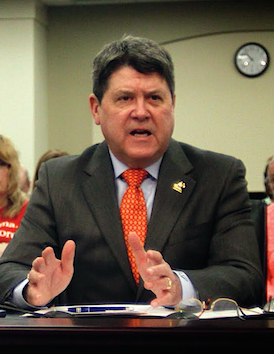Negotiations between state House and Senate leaders over the 2016-18 budget broke down late Sunday without an agreement, leaving open the possibility that the 2016 session may end without a spending plan in place.
UPDATE: House leaders say budget talks will resume Tuesday and the final day of the 2016 General Assembly will be Friday, April 15.
Legislative leaders convened at 2 p.m. Sunday, took a break for dinner, then returned to the Capitol before leaving without an agreement about 10:30 p.m. The session is scheduled to end Tuesday unless lawmakers decide to extend it, something Senate Republicans have indicated they will not do. If either chamber convenes on Tuesday, that will be the final day of the regular session.
According to the state constitution, the session must conclude by midnight on April 15. The General Assembly has used 59 of a possible 60 days. Without a budget in place, Gov. Matt Bevin would have to call a special session at a cost of about $62,000 per day prior to July 15, when the current budge expires.
The proposed two-year budget is about $21 billion.

House Democrats, who continue to balk at Bevin’s cuts in higher education, issued a statement calling for the current session to be extended to later in the week so negotiations can continue.
“It is unfortunate that the Senate walked away during discussions about changing the calendar,” the statement said. “Because of the late hour, and the considerable amount of work remaining, we recommended moving the General Assembly’s last day to Wednesday, Thursday or Friday. This would save a considerable amount of taxpayer dollars by avoiding a special session.
“We have gone through about half of our differences document and resolved most of the disagreements in that portion. We also thought we had a framework for a compromise, but we learned that there were problems in some areas we thought had already been agreed to. We in the House remain committed to resolving the budget during this session. We are ready to get together again at the call of the budget chairs.”
Bevin issued a statement Monday afternoon, urging legislators to complete their work this week and avoid a special session.
“We have until Friday, April 15th to finish the budgetary process,” Bevin’s statement said. “I’m calling on our House and Senate leaders to continue the good discussion that has been going on and extend the calendar to Friday to get the budget passed.
“I thank the General Assembly for the work that has been done. I thank our university presidents for signing a letter and agreeing to be part of the solution. I’m grateful to them for recognizing the financial needs of the state and wanting to be part of ensuring that we build a strong financial foundation.
“I’m confident that we can get this done. The taxpayers of Kentucky expect it of us. We should not have to come back for a special session. If we fail to pass a budget it will inflict pain and suffering on people in the state for reasons that don’t need to happen.”
On Friday, seven of the eight presidents of Kentucky’s public universities reluctantly agreed to Bevin’s compromise budget cuts of 4.5 percent over each of the next two years in an attempt to break the budget impasse.
In a letter to Bevin, House Speaker Greg Stumbo and Senate President Robert Stivers, the presidents said they would accept the cuts with the expectation that state funding for higher education would increase in the next biennium. The letter also said they would accept a 2 percent cut in the current fiscal year should it be upheld in court.
The letter said the compromise was preferable to ending the session with no budget agreement.
“We cannot imagine the circumstance of no budget,” the letter said. “Therefore, we are prepared to manage reductions in accord with the Governor’s final offer of 2 percent in the current year if it is determined by the courts to be permissible, and a 4.5 percent reduction from the 2015-2016 enacted base in each year of the new biennium.
“We make this difficult decision based on our trust that you have committed to making new investments in higher education in the following biennium, investments that will enhance our state’s economy, and the health and well-being of Kentuckians. Furthermore, we recognize Kentucky State’s unique mission and the need to be addressed separately.”
Bevin had proposed across the board cuts, with some exceptions, in state government in order to fund the state’s troubled pension funds. The House had provided funding for the pensions, but maintained that cuts in higher education were not necessary since the state was not facing a budget shortfall.
The Senate’s original proposal maintained Bevin’s higher education cuts, but then offered a compromise of 4.5 percent over each of the next two years.
“We are hopeful that you can work together to resolve these differences, and reach an agreement, which attempts to address the myriad of needs experienced by our citizens,” the presidents’ letter continued, “and we trust you will continue to support our institutions and their vital role in meeting many of those needs, from job training, to career preparation, and from leading edge research to the direct provision of healthcare.”
Earlier Friday, House leaders had proposed a 2 percent cut in higher education in each of the next two years as its compromise.
“We have worked hard at finding a middle ground since budget talks first began, and we have not gotten much back in return,” House leaders said in a joint statement. “However, our university presidents have been put in a position that is unfair and unwise. We still think that postsecondary education should not be cut, but if it is, our plan is the one that should be followed.”
The only president who did not sign the letter to Bevin and legislative leaders was Dr. Raymond Burse, who leads Kentucky State, the smallest public university.
Bevin issued an order last week directing immediate cuts to colleges and universities of 4.5 percent for the current fiscal year. State attorney general Andy Beshear issued an opinion saying Bevin lacked the authority to reduce the budgets absent a finding of a shortfall in the current budget.
Beshear indicated Friday that he would sue the administration on Monday if it did not rescind the order. Stumbo and other House leaders indicated that Bevin’s action should be challenged in court whether or not a budget agreement was reached.
Staff report





















